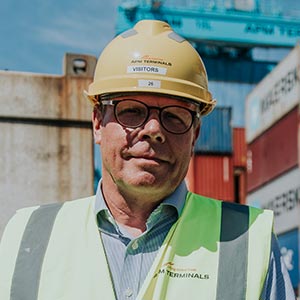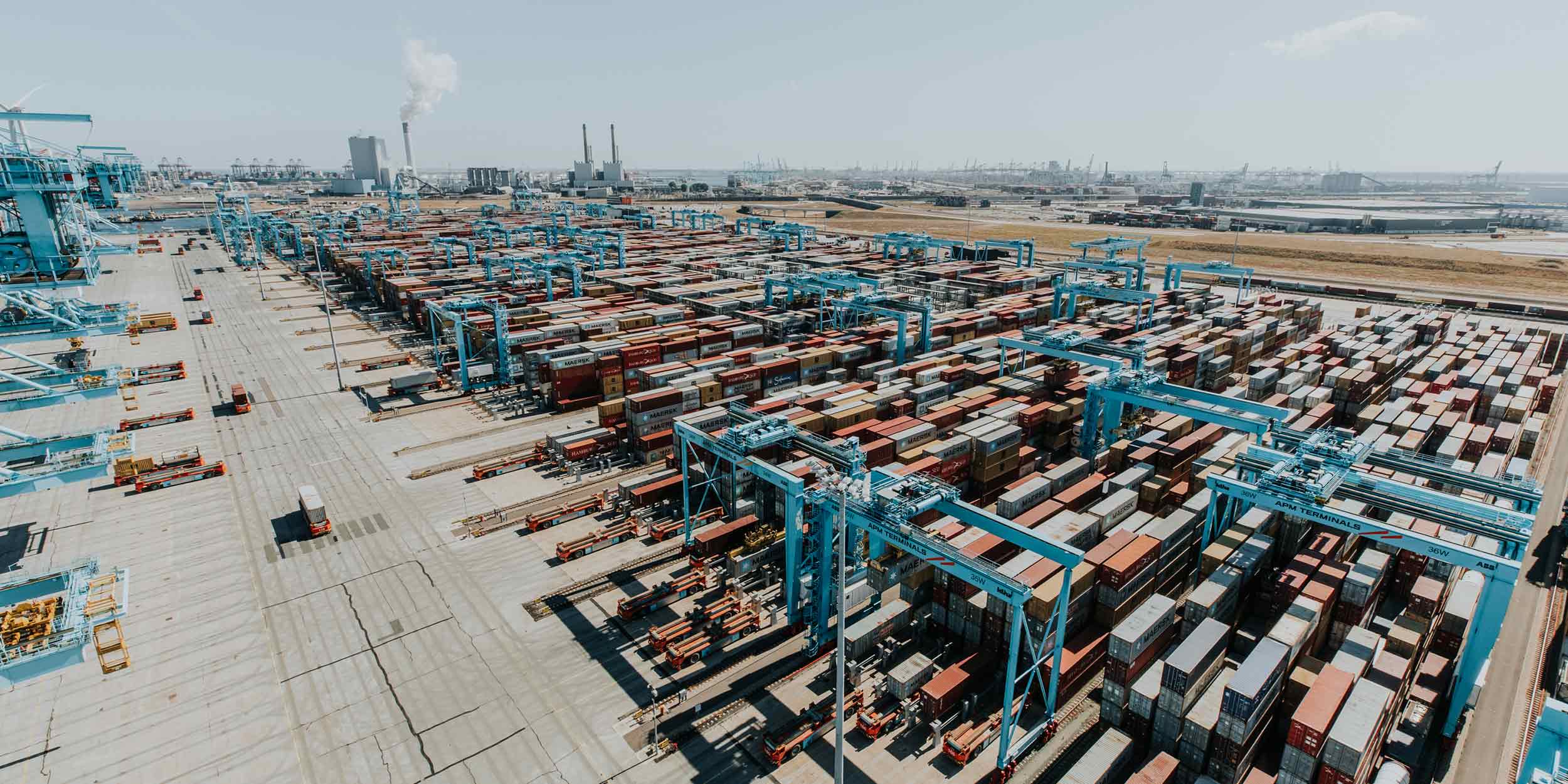Zurich supports Maersk to strengthen the climate resilience of its ports
Climate ChangeVideoMarch 14, 20236 min read
Ports are vulnerable to current and future climate change-related risks. Maersk wants to ensure its port terminals are future-proof and has brought in expertise from Zurich Resilience Solutions to help.
Ports are among the most exposed sites in the world to climate risks. Typically located along open coasts or in low-lying estuaries and deltas, ports are vulnerable to windstorms, flooding and storm surge.
Their operations can be interrupted by fog and snow, while heatwaves can restrict working conditions. But ports will also be on the frontline when one of climate change’s most worrying long-term impacts – sea level rise – begins to engulf the world.
“In the past decade, we have seen coastal flooding at our terminal in Port Elizabeth, New Jersey; flooding at our Salalah terminal in Oman; a cyclone hit our Pipavav terminal in India; and regular exposure to tropical windstorms to our terminals in Miami, Florida, and Mobile, Alabama,” says Lars Henneberg, VP, Head of Risk Management at A.P. Moller-Maersk (‘Maersk’), one of the world’s largest container-shipping companies.
Extreme weather can cause immense physical damage to port equipment, like cranes, and to the supporting infrastructure, such as electrical substations. Heatwaves can even melt the tarmac underneath the containers. Not only does this damage cause physical losses, but also business interruption costs as the terminal may not be able to operate at maximum capacity or even be forced to close.
“The average cost of physical damage and business interruption due to climate change hazards is expected to increase by 130 percent by 2050, compared to a 2020 baseline.”

The threat from climate change
It’s no wonder that Maersk – with more than 67 port terminals, 300 inland facilities and 600 container ships – identified climate change, both physical and transition risks, as the biggest threat to its business in a recent enterprise risk management (ERM) exercise.
The ERM process was followed up by a study that analyzed 107 of Maersk’s most important land-based assets (port terminals, inland warehouses and data centers). It was designed to establish how and where Maersk’s operations and business were most exposed to climate risks over the next 30 years. “The study concluded that the average cost of physical damage and business interruption due to climate change hazards is expected to increase by 130 percent by 2050, compared to a 2020 baseline,” says Henneberg.
For the next step, Zurich’s global risk consulting unit – Zurich Resilience Solutions (ZRS) – was engaged by Maersk. The ZRS team develops data-driven and science-based insights to develop and implement risk management strategies. Its services cover a range of risk areas, from supply chain, cyber risks, to sustainability and climate change. Highly specialized risk engineers from one of ZRS’s specialist units, Climate Resilience, were tasked to undertake on-site climate assessments at five critical port terminals in Rotterdam, Netherlands; Port Said on the Suez Canal in Egypt; Aqaba, Jordan; Port Elizabeth, New Jersey; and Los Angeles, California. These site visits are supported by a team of CCRS climate data experts who use the latest climate science, data and modeling techniques to develop mitigation solutions tailored to each port.
Maersk selected ZRS, in part, due to its existing strong relationship with the Zurich Insurance Group (‘Zurich’). Zurich’s digital expertise in marine insurance supports Maersk’s online cargo insurance solution called Maersk Cargo Insurance. Zurich also provides risk transfer and fronting services to Maersk’s own captive insurance company, Maersk Insurance, and has been providing risk engineering surveys on property and business interruption exposures since early 2021.
“ZRS has the necessary scientific and technical risk engineering capabilities, combined with risk assessment and impact analysis expertise."
Peter Gede, Maersk’s Claims & Loss Prevention Manager, says it’s vital that Maersk has an overview of the current risk landscape, especially as it retains risks through its captive. “We need to understand if the threats we face meet our risk appetite. Then we can either mitigate the risks or transfer it out of the captive and find separate insurance cover.”
But as well as highlighting the ports’ vulnerabilities to climate risks, Maersk also wants ZRS to provide actionable recommendations to mitigate these risks and improve climate resilience. And Henneberg believes ZRS has the right skillset to provide these insights.
“ZRS has the necessary scientific and technical risk engineering capabilities, combined with risk assessment and impact analysis expertise. This will ensure we have recommendations that are both practical and operational and will help us mitigate vulnerabilities and increase climate resiliency on our port terminals.”
ZRS has already completed on-site climate assessments in Rotterdam, Aqaba and Port Said. There will be follow-up workshops at each port terminal to discuss the vulnerabilities and recommended mitigation actions that will feed into each terminal’s maintenance schedules and potential investments into upgrading physical resilience measures.
Gede is also impressed with how ZRS’s climate assessments will examine the resilience of the surrounding region. “Our business is no longer focused on port-to-port transportation, instead we provide end-to-end logistics solutions to our customers,” says Gede.
“Our port terminals rely on a network of roads, rail and rivers to transport our cargo to inland destinations. It means we cannot look at the climate resilience of our port terminals in isolation, we need to have a big picture view of the risk. And ZRS provides this.”
Hanno Mijer, Global Head of Zurich Resilience Solutions, says that close collaboration with Maersk has enabled them to develop a deep understanding of its business and risk exposures.
“Our aim, as with all customers, is to couple our understanding of Maersk’s value chain with our end-to-end climate change analysis services. This will help strengthen Maersk’s climate resilience by providing actionable insights and recommendations that will protect its business today and into the future.
“There’s a growing realization that climate change is happening now. As a result, we have seen demand for climate resilience services grow exponentially in recent years. More businesses urgently want to define and deploy effective climate adaptation and mitigation strategies to protect them in both the short- and long-term. That requires specialist knowhow and where ZRS provide real value to our customers.”
Climate Resilience
Our Climate Resilience experts help you identify and manage climate risks, and prepare you for climate reporting.



